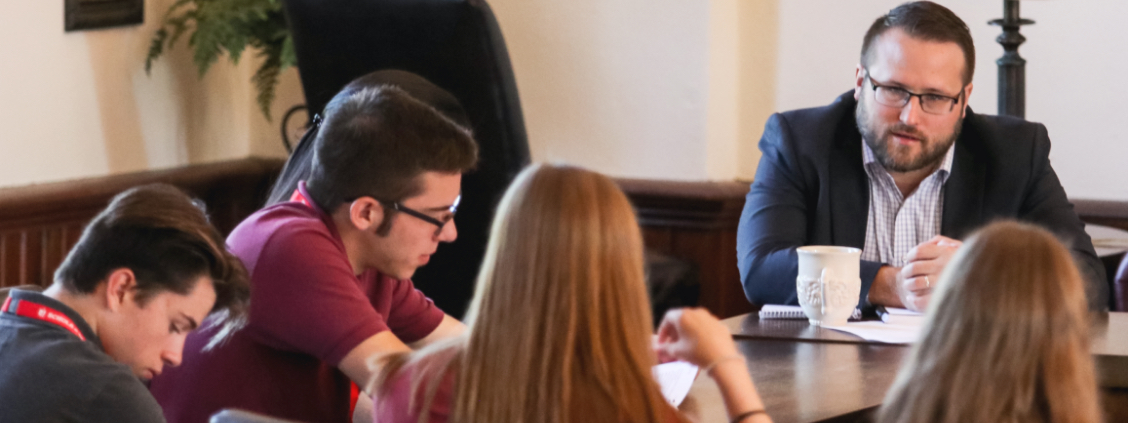Great Books and the Professional Life

As a college whose curriculum is largely comprised of study and discussion of great books, the Honors College does not aim directly or principally at preparation for a particular profession or career. Nonetheless, the sum total of a student’s experience in the Honors College will help students in crucial and vitally meaningful ways to an eventual attainment of excellence in professional life, as well as in those domains of human life that matter most highly.
A mind whose cultivation takes place over the course of four years through serious reading and discussion of the most thoughtful and artfully composed writings in human history is a mind which has been seeking to understand reality in its deepest, broadest, and most subtle dimensions. Such a mind and such a human being will have been nurtured and strengthened in and through daily encounters with authors awake to what is good, to what is beautiful, and (thankfully) to what is laughable. Important, also, in our curriculum will be thoughtful reading of authors sobered by an awareness of the dark and tragic sides of our world and situation. Accordingly, it is not too much to say that the educational experience of our graduates will be conducive to their seeing things as they should be and to their looking realistically upon things as they are. This will surely be welcomed by any profession which seeks to have strength of mind and high character in its midst. In such persons, the professional world will find men and women habituated to a careful and concentrated attentiveness to matters at hand and to formulating thoughtfully measured responses to matters high, low, and complex.
The stated aims – seriously pursued – of the Honors College will occasion professionals and human beings who in their college experience will have tasted controversy at its highest level, intellectual opposition at its strongest, the constant imperatives of discipline and careful preparation, the delights of friendly, respectful, and collaborative endeavoring, the charms of competence, the importance of both principle and scrutiny of individual circumstances in prudential deliberation, and an enlivening as well as humbling awareness of the difficult availability and ever-beckoning allure of wisdom.
Success in the Honors College will occasion for students a versatile readiness for a range of undertakings and place them on a clear path to do their own thinking. In moving in this direction, Honors College students will also have come to the realization that as desirable as doing one’s own thinking is, even more desirable is thinking well about the immediate and long-range challenges of human and professional life. Having spent time with those human beings whose writings point to and reveal what it means to think well, students in the Honors College will be prepared to approach with intelligence and persistence the duties and challenges of professional life and to do so with the freedom, discipline, and confidence of persons who have benefitted from four years of reflections upon the nature, place, and importance of matters ordinary and extraordinary in human life.
In the final analysis, it must be said that the four-year educational experience made available to students in the Honors College is distinctive in its emphasis upon a comprehensive and hierarchical approach to and understanding of excellence. It is no accident, then, that a principal focus of the Honors College is upon a cultivation of intellect through exposure to and study of authors regarded in the tradition of the West as extraordinarily influential, penetrating, graceful, and wise. But as crucial and pervasive as is such cultivation, every effort is made to occasion or nurture in our students spiritual growth, vital friendships, experience of beauty, strength of character, refinement of taste, and the healthy lightness of play and playfulness. One could even say that the varied components of the Honors College are experiences in and preparations for a way of life marked by desire for and progress in all of the important excellences. As such, this kind of education would not only enhance the eventual professional lives of its graduates. It would also, and still more importantly, add substantially – immeasurably even – to the future lives of its beneficiaries as citizens, friends, spouses, parents, and persons of faith. It would do so in that education at its highest, directing the human soul to its natural end and particular souls to their individual callings with the most solid of foundations and thereby to an affinity that is receptive to those graces which redeem, complete, and elevate still higher our humanity.

